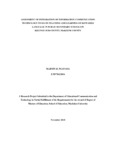| dc.description.abstract | Integration of technology in education is considered as a strategy of transforming the quality of education all over the world. The purpose of the study was to assess of integration of ICT tools in the teaching and learning of Kiswahili Language in public secondary schools in Kilungu sub-county. With respect to the teaching and learning of Kiswahili language in secodary schools, the objectives of the study were: to determine the level of competency of teachers in integrating ICTs, to assess the support of school management on the use of ICT, to investigate the challenges that Kiswahili language teachers face in the integration of ICT tools, and to establish teachers’ perceptions about ICT integration. The research design used in the study adopted a descriptive survey design. The study was carried out in Kilungu sub-county in the western region of Makueni County. The study targeted a population of 22 secondary schools in Kilungu Sub-county, 22 Principals, 48 Kiswahili language teachers and 1540 form three students in these schools; the schools were grouped into three categories using stratified sampling while the 48 teachers in these schools were found using purposive sampling. 22 principals were purposively sampled; learners were sampled using simple random sampling. Data collection instruments used were questionnaires for teachers, interview schedules for principals and classroom observation checklist for both teachers and learners. Data was collected through administering teachers’ questionnaires by the researcher, interviewing principals and using observation checklist for both teachers and learners. Statistical package for social sciences (SPSS) version 23 was used to analyze the data. The study established that majority of Kiswahili teachers in Kilungu sub-county have knowledge in computer and how it functions. They can also create teaching aids with computers and use computers for lesson delivery and demonstration while teaching and learning of Kiswahili language in a classroom setting. The findings from the observation made by the researcher during lesson presentation by the Kiswahili teachers in the schools visited affirmed that teachers were able to use computers through the production of media, lesson preparation, and presentation during Kiswahili lesson. 81.83% of the Kiswahili teachers agreed that school management encourages teachers to acquire IT skills and also motivates them to use ICT based tools in the teaching and learning of Kiswahili language. Majority of the teachers agreed that ICT tools make lessons more interesting and interactive. The majority agreed that insufficient ICT tools hinder them from using ICT tools during content delivery. Based on the findings of this study, the researcher concludes that most of the teachers are competent in the use and integration of ICT tools in the teaching and learning of Kiswahili language and that the teachers have a positive perception about the integration of ICT in the teaching and learning of Kiswahili language. The study made three recommendations: the ministry of education in collaboration with the ministry of ICT should supply computers to all schools in Kenya and make the integration of ICT in the teaching and learning process mandatory for all schools; schools should obtain an alternative power supply particularly in the areas with no electric connection to enable effective use of ICT tools in the teaching and learning process. | en_US |

